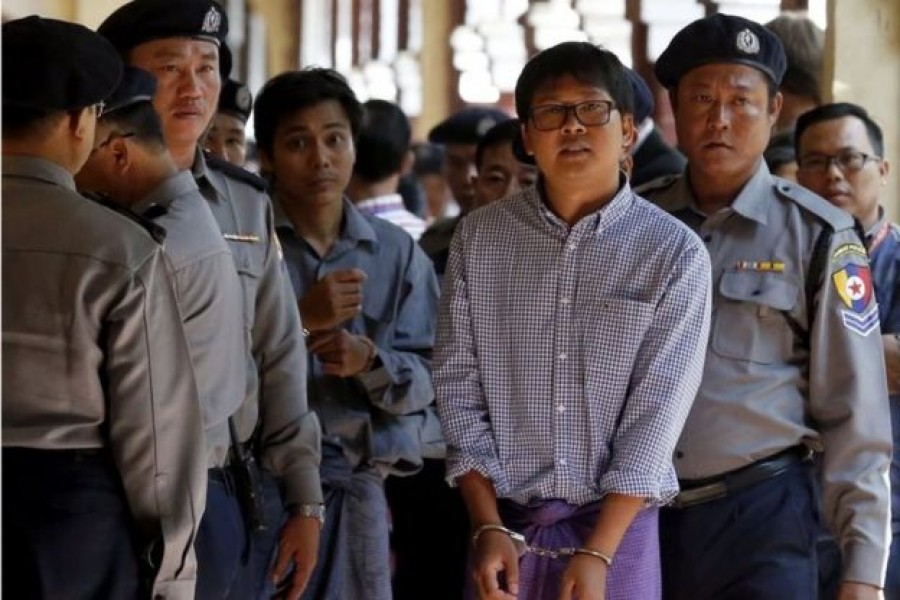Lawyers for two Reuters reporters jailed in Myanmar for breaking a colonial-era official secrets law appealed to the Supreme Court on Friday against their conviction, as a rights group said the government wielded repressive laws against peaceful critics.
The appeal, citing evidence of a police set-up and lack of proof of a crime, came as New York-based Human Rights Watch said Nobel laureate Aung San Suu Kyi’s government had dashed hopes for Myanmar’s first democratic leader in decades to protect free speech.
“Our petition asks the Supreme Court to finally provide justice to Wa Lone and Kyaw Soe Oo, reverse the lower courts’ errors, and order the release of our journalists,” Reuters said in a statement.
Wa Lone, 32, and Kyaw Soe Oo, 28, were jailed for seven years after being convicted in September in a landmark case that has raised questions about Myanmar’s progress towards democracy and sparked an outcry from diplomats and human rights advocates.
Also on Friday, Myanmar released from prison a policeman who told a court last year how officers had planted secret documents on the two reporters in order to “entrap” them.
The policeman, Moe Yan Naing, criticized the law under which he was punished.
“This police disciplinary law is one of the laws we must amend while we are marching on the path towards democracy,” Moe Yan Naing, said on his release after serving about nine months of a one-year jail sentence for violating police discipline.
“This law can cause police much suffering because it is outdated,” he told reporters outside Insein prison, on the outskirts of the commercial capital, Yangon.
Asked how he felt about the people who ordered his arrest, he said he would console himself through religion.
“I am a Buddhist, I can find peace with that through our Buddhist way,” he said, and that he felt “sorry” for the two reporters still behind bars.
Human Rights Watch said in a report freedom of expression had been deteriorating since Suu Kyi’s administration came to power in 2016, with prosecutions creating a “climate of fear” among journalists.
“Aung San Suu Kyi and the National League for Democracy promised a new Myanmar but the government still prosecutes peaceful speech and protests and has failed to revise old oppressive laws,” the report’s author, Linda Lakhdhir, said in a statement.
The report quoted figures from Myanmar free-speech group Athan showing that prosecution for peaceful speech featured in at least half of about 140 cases filed since 2016 under the Telecommunications Act, which prescribes up to two years in jail for anyone who “defames” someone using a telecoms network.
“Aung San Suu Kyi’s government has had a real opportunity to abolish the tools of oppression used by the military juntas, but has instead used them against peaceful critics and protesters,” Lakhdhir said.
In September, Suu Kyi said the jailing of the Reuters reporters had nothing to do with freedom of expression. The week after their conviction, she said they were sentenced for handling official secrets and “were not jailed because they were journalists”.
Reuters could not immediately reach government spokesman Zaw Htay for comment.
Before their arrest, the reporters had been working on a Reuters investigation into the killing of 10 Rohingya Muslim men and boys by security forces and Buddhist civilians in western Myanmar’s Rakhine State during an army crackdown that began in August 2017.
The operation sent more than 730,000 Rohingya fleeing to Bangladesh, according to UN estimates.


